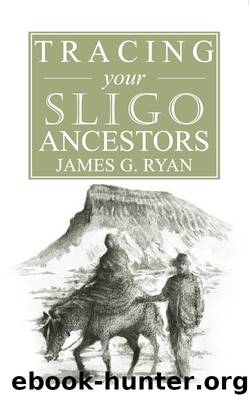A Guide to Tracing your Sligo Ancestors by James Ryan

Author:James Ryan
Language: eng
Format: epub
Publisher: FlyLeaf Press
Seal of Sligo Corporatioon 1869
From a page in âSir Arthur Vicars, Index to the Prerogative Wills of Ireland, 1536-1810â.
Chapter 7 Wills, Administrations and Marriage Licences
A will is the written instruction of a person as to the division of their assets after their death. The document in which these intentions are written is formally known as a Last Will and Testament, but usually abbreviated as a Will, and there are certain legal requirements for the will to be declared valid. The signing of the will must be witnessed, and the âtestatorâ (the person who makes the Will) must appoint an âexecutorâ (a trusted person) to carry out their instructions. After the testator has died, the will must be âprovenâ by a Probate court (i.e. legally accepted as valid). If a person dies âintestateâ (without making a Will) the court decides on distribution of their property. This is called âAdministrationâ, and also occurs when a Will is deemed to be inoperable (e.g. where it is not witnessed or the executor is also deceased). In making this decision, the court will take account of the deceased personâs assets, surviving family and creditor situation, and other legal requirements. It then appoints an âadministratorâ, usually a relative or responsible friend, to oversee the distribution of the estate as determined by the court. The administrator enters a bond for a sum of money as a surety that the instructions of the court will be carried out. These bonds are called Administration Bonds.
Unfortunately, the major collection of Irish Wills up to 1900 was destroyed in the Public Records Office fire of 1922. Few original wills therefore exist for the period before 1890, but all survive from 1904. However, useful records can be found, as the PRO/NAI have collected many original wills since the fire, and there are other forms of testamentary record which were created in the process of proving, executing and archiving wills. In addition, researchers working on the will collection before it was destroyed also created valuable records. These additional records include:
Will Abstracts. Details from Wills have been abstracted for legal and family history purposes. The extent of detail will depend on the purpose. Will-books, compiled by Probate Courts for administrative purposes, are one example. Genealogists also abstracted details for their purposes. For instance, William Betham extracted biographical details from pre-1800 Prerogative documents (in the NAI) and also constructed sketch pedigrees from these abstracts (in the NLI).
Will Index. Although most Wills have been destroyed, the indexes to the collections survive. They provide a name, residence (sometimes just a place name) and date of death of testators. These indices may be searched online through the subscription sites www.ancestry.co.uk, www.findmypast.ie and www.origins.net. Further information is below.
Grant Books. Registers indicating grants (i.e. court approvals) of wills.
Calendars: From 1858 onward (see below for significance of this date), a short summary of every proven will or administration was compiled giving the testator, date and place of death, date of probate, address, occupation, value of the estate and to whom it was granted.
Download
This site does not store any files on its server. We only index and link to content provided by other sites. Please contact the content providers to delete copyright contents if any and email us, we'll remove relevant links or contents immediately.
Twilight of the Idols With the Antichrist and Ecce Homo by Friedrich Nietzsche(17707)
CHERUB: The Recruit by Robert Muchamore(1828)
CHERUB: The Fall by Robert Muchamore(1712)
CHERUB: Man vs Beast by Robert Muchamore(1611)
I Capture the Castle by Dodie Smith(1574)
The Edge of the Abyss (Sequel to The Abyss Surrounds Us)(1468)
Black Genesis by Robert Bauval(1319)
A Brief History of Everyone Who Ever Lived by Adam Rutherford(1249)
all by Unknown Author(1243)
Where Do I Start? by Chase Taylor Hackett(1060)
2016 Baby Names Almanac(978)
Painfully Rich by John Pearson(958)
Genetics by Adam Rutherford(921)
How to Argue With a Racist by Adam Rutherford(881)
2011 Baby Names Almanac(842)
Black Hawk Down by Mark Bowden(829)
It's All Relative by A. J. Jacobs(798)
My European Family by Karin Bojs(786)
Spook Street (Slough House) by Mick Herron(781)
